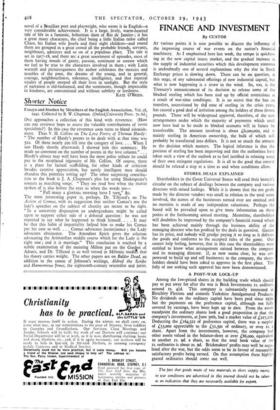Shorter Notice
ONE approaches a collection of this kind with reverence. (How can one reviewer hope to assess the valuable contributions of seven specialists?) In this case the reverence soon turns to bland astonish- ment. Thus V. H. Collins on The Love Poetry of Thomas Hardy: " The number of Hardy's poems to be dealt with at that time was 51o. Of these nearly zoo fell into the category of love. . . . When I saw Hardy shortly afterwards I showed him this summary. He made no comment on the number of poems in the love column." .. Hardy's silence may well have been the most polite tribute he could pay to the misplaced ingenuity of Mr. Collins. Of course, there is a place for factual scaffolding, for other kinds of criticism besides creative appreciation, but surely intelligent men should abandon this pointless totting up? The other surprising contribu- tion to the book is J. A..Chapman's plea for using Shakespeare's sonnets as marching songs. " They are read best when the matter spoken of is also before the eyes as when the words are-
" Full many a glorious morning have I seen," &c.
The most interesting paper is, perhaps, Dr. Tillyard's on The Action of Comus, with its suggestion that neither Comus's nor the lady's speeches on the subject of chastity are meant to be right. " In a university disputation an undergraduate might be called upon to support either side of a debated question : he was not expected to say what he happened to think himself. . . . It may be that this habit of impartiality helped him to make his Comus put his case so well. . . . Comus advocates incontinence • the Lady advocates abstinence. The Attendant Spirit gives the solution advocating the Aristotelian middle course which for the Lady is the right one ; and it is marriage." This conclusion is reached by a subtle examination of the meaning Milton put on the Garden of Adonis, and Dr. Tillyard is so well versed in Miltonic studies that his theory carries weight. The other papers are on Balder Dead, an addition to the canon of Johnson's writings, Aldred the Scribe and Harmonious lanes, the eighteenth-century orientalist and jurist.


























 Previous page
Previous page